SWEDISH SOUTH ASIAN STUDIES NETWORK
Visit to Pune University,
Thursday 22 November 2007
Web page: http://www.unipune.ac.in/
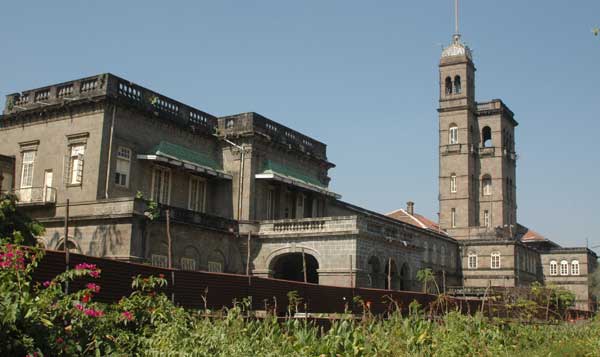 Pune is a city famous for its many educational institutions. Because of its favourable climate due to its height over the sea it is also a favourite destination for foreign students coming to India. Pune University with its 472 affiliated colleges boasts of the fact that it is the one university in India with maximum amount of foreign students. Out of totally 550.000 students, 14.000 come from 89 countries around the globe, mainly from Asia, Africa and the Middle East but also to some extent from Europe and America.
Pune is a city famous for its many educational institutions. Because of its favourable climate due to its height over the sea it is also a favourite destination for foreign students coming to India. Pune University with its 472 affiliated colleges boasts of the fact that it is the one university in India with maximum amount of foreign students. Out of totally 550.000 students, 14.000 come from 89 countries around the globe, mainly from Asia, Africa and the Middle East but also to some extent from Europe and America.
It was therefore a natural choice for us to visit Pune University and its beautiful campus in Ganeshkhind, even though the number of Swedish collaboration projects is limited, in fact we only knew about one current project between Jönköping University/Department of Chemical Technology, School of Engineering; and the Dept. of Environmental Sciences in Pune.
The Head of this department, Prof. Vikram Ghole, was kind enough to organise a meeting with people based at his department and also related departments within the field of natural sciences. Prof. Ghole however also arranged a visit to the Krantijyoti Savitribai Phule Women’s Studies Centre to meet its Head, Dr. Vidyut Bhagwan. Late in the afternoon, we were also given an opportunity to set up a meeting with the Pune University Vice-Chancellor, Dr. Narendra Jadhav, and another key person in charge of Pune University’s international collaboration projects, namely Dr. Vasudha Garde, Director for the International Students Centre.
Meeting at Dr. Nanasaheb Parulekar Paryavaran Bhavan:
Dept. of Environmental Sciences
Web page: http://www.unipune.ac.in/dept/science/environmental_science/
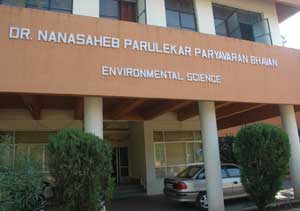 People we met:
People we met:
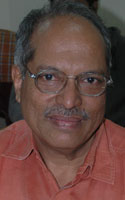 • Prof. Vikram Ghole (photo to the left), Head of Department & Professor in Biochemistry. Specialised in Toxicology – Earthworm and chick embryo as model for study of DNA damage and tesatogenic effects. Also Biodegradation of toxic compounds.
• Prof. Vikram Ghole (photo to the left), Head of Department & Professor in Biochemistry. Specialised in Toxicology – Earthworm and chick embryo as model for study of DNA damage and tesatogenic effects. Also Biodegradation of toxic compounds.
• PhD Candidate Arundhati Vishwarrao, researcher in Environmental Education. Visiting faculty to Dept. of Env. Sciences, for Noise pollution. Teacher educator (visiting colleges in & around Pune), and member of Aapanach – organisation of teachers & teaching educators. Member of Mensa. Visiting faculty to Jönköping University. Specialised in Global survival issues (water, ESD, biodiversity), and Intercultural teaching.
• Prof. K.N. Dhumal, Department of Botany. Specialised in Ecotourism, Xenobiotic stress, Soil physiology, Ecophysiology, Pollution biology.
• Prof. Alaka S. Gadgil, Department of Geography. Specialised in Air pollution meteorology.
• Prof. R.K. Subthankar, Dept. of Atmospheric and Space Sciences. Specialised in Coastal Geomorphology and Seismology.
• Prof. N.J. Pawar, Department of Geology. Specialised in Environmental Geochemistry, and Hydrogeology.
• Dr. Chandrakant G. Wakankar. Formerly working at Chief Education Office (India) & WWF India. Specialised in Conservation Biology/Ecology, and Environmental Education.
• Dr. Ravindra S. Gavali. Research fields: Biodiversity, Conservation, Microbial diversity, Wildlife management, Conflict management, Ecotourism, Wetland ecology & Pollution monitoring, Environment education, Avian ecology, Plant functional traits.
• Dr. S.S. Rathi. Contributing teacher at the department, and Visiting Professor, Advanced Research Centre of High Energy Materials, Central University, Hyderabad.
• Mr. D.M. Mahajan. Specialised in Plant biodiversity, Ecology, Taxonomy, Environmental impact assessment, Remote sensing, Invasion biology.
• Mrs. Rashmi R. Tathwardan. Specialised in Ambient air pollution, and Indoor air pollution.
• Dr. Prabhakar N. Wavde, Research Associate. Specialised in Groundwater quality assessment, Environmental microbiology, biotechnology and education.
• Mr. Wagh Prashant Laxman, Teaching Associate. Specialised in various aspects of Bird life, such as Roosting behaviour, and Impact of water pollution.
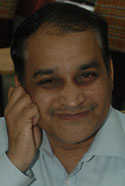 • Dr. Rajendra P. Jagdale (photo to the right), Director General, Science and Technology (Scitech) Park, University of Pune (web page: http://www.scitechpark.org.in) Specialised in Wildlife biology, Environmental assessments, Remote sensing//GIS.
• Dr. Rajendra P. Jagdale (photo to the right), Director General, Science and Technology (Scitech) Park, University of Pune (web page: http://www.scitechpark.org.in) Specialised in Wildlife biology, Environmental assessments, Remote sensing//GIS.
The Dept. of Environmental Sciences was established as an interdisciplinary school of the University of Pune in 1978. The department runs programmes on MSc; PhD and postgraduate levels, covering all major aspects of Environment, including Water, Air, Soil and Noise Pollution; their Control Technology; Effects of Pollution on Ecosystem and Management of Environment, etc. The department also conducts a course on Bio-resources every year, for standard ten students in coordination with the government; and courses on Sustainable Development in collaboration with the Centre for Environmental Education.
We were given a broad overview of the research carried out in the department by the scholars present at the meeting, and they were all keen on establishing collaboration with Swedish colleagues in their fields:
• Water Treatment
• Ecotoxicology
• Air Monitoring
• Noise Pollution Monitoring
• Ecotourism
• Study of Ecology
• Ground water studies
• Environmental Education
• G.I. Studies
A formal collaboration project has been going on for five years with the Department of Chemical Technology, School of Engineering at Jönköping University, but also with the Dept. of Education at the same university. The contact persons for this Linnaeus Palme exchange programme are Prof. Ghole on the Indian side, and Senior Lecturer Bo Nordström on the Swedish side. Two students and two teachers go in each direction every year – two Swedish students were supposed to arrive only a few days after our visit.
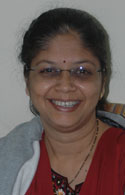 Other Swedish contacts have also been established. Ms. Arundhati Vishwarrao (photo to the right) has gone to Jönköping to teach a couple of times, but has also got other Swedish contacts through involvement in a UNESCO project on Education for Sustainable Development in Action (part of the United Nations Decade of Education for Sustainable Development plan, 2005-2014). She participated in a workshop organised in Göteborg in March 2006, and her workshop paper was published in a report titled ”Drivers and Barriers for Implementing Learning for Sustainable Development in Pre-School through Upper Secondary and Teacher Education”, edited by Inger Björneloo and Eva Nyberg (Technical Paper No 4/2007).
Other Swedish contacts have also been established. Ms. Arundhati Vishwarrao (photo to the right) has gone to Jönköping to teach a couple of times, but has also got other Swedish contacts through involvement in a UNESCO project on Education for Sustainable Development in Action (part of the United Nations Decade of Education for Sustainable Development plan, 2005-2014). She participated in a workshop organised in Göteborg in March 2006, and her workshop paper was published in a report titled ”Drivers and Barriers for Implementing Learning for Sustainable Development in Pre-School through Upper Secondary and Teacher Education”, edited by Inger Björneloo and Eva Nyberg (Technical Paper No 4/2007).
Dr. Rajendra P. Jagdale also informed about other Indo-Swedish connections in Pune. As Director General of Pune University’s Science and Technology Park he has good contacts with the Swedish companies established since a long time in the city, Sandvik and Atlas Copco being the most renowned. Dr. Jagdale has been to Sweden himself and he talked enthusiastically about the excellent research opportunities in Pune. Currently there are 28 independent R&D (research and development) institutes located in and around Pune, not counting the 1.600 R&D centres affiliated to industries. It should be added that Pune itself is a favourite location for many national and international IT and affiliated industries.
Visit to Krantijyoti Savitribai Phule Women’s Studies Centre
Web page: http://www.unipune.ac.in/snc/womens_studies_centre/
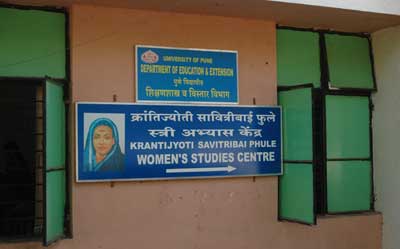
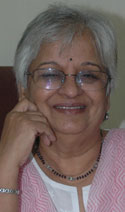 We were introduced to Dr. Vidyut Bhagwat (photo to the left), Director for Pune University’s Women’s Studies Centre, soon to become a university department, and a couple of the PhD students. Dr. Bhagwat happens to know Prof. Staffan Lindberg, SASNET’s former coordinator, and a Swedish wooden horse (dalahäst) was standing on her desk, a present given to her by Staffan.
We were introduced to Dr. Vidyut Bhagwat (photo to the left), Director for Pune University’s Women’s Studies Centre, soon to become a university department, and a couple of the PhD students. Dr. Bhagwat happens to know Prof. Staffan Lindberg, SASNET’s former coordinator, and a Swedish wooden horse (dalahäst) was standing on her desk, a present given to her by Staffan.
She presented the different courses that the Centre offers, including teaching certificate & diploma courses. A MPhil programme will soon be introduced, focusing on Gender in South Asia, and a postgraduate interdisciplinary certificate course in Women’s Studies. Dr. Bhagwat informed us that 10 per cent of the students are men.
Connected to the Women’s Studies Centre is the so-called Cell Against Harassment and Atrocities Against Women, established by the University of Pune in 2001. Dr. Bhagwat is the Secretary of the Cell, functioning as an educational resource as well as a complaint centre for the members of the faculty, staff and students of the University.
While at the Centre, we were also introduced to Prof. Sharmila Rege, from the Dept. of Sociology.
Meeting with VC Pune University,
and Director for the International Students Centre
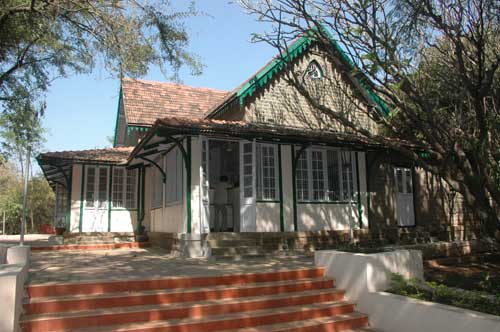
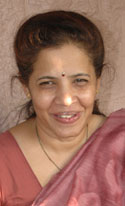 |
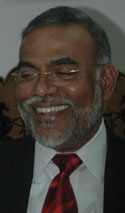 |
| Vasudha Garde and Narendra Jadhav. | |
We met the Vice-Chancellor, Dr. Narendra Jadhav in his temporary office, a side building to the main Pune University building (the old Viceregal Palace, now under renovation). In spite of his hectic schedule, Dr. Jadhav was most interested to meet us and in a traditional way we were warmly welcomed with flower bouquets. He informed us about Pune University and its long-standing reputation for being an institution of excellence, and being the most international of all Indian universities.
The reasons why Pune attracts so many foreign students, Dr. Jadhav attributed this to several factors, including the favourable climate, the closeness to Mumbai and the presence of a large IT industry. Besides Pune has a long history of being an educational centre, already during the colonial period several respected colleges and schools were established in the city.
Pune University has a large number of MoUs with foreign universities, and he welcomes more collaboration also with Swedish universities. The VC informed us that a delegation from Finnish universities recently came to University of Pune, and that resulted in a MoU.
We also had a fruitful meeting with Dr. Vasudha Garde, Director for the International Students Centre, and the person in charge of the international students exchange. She also welcomes initiatives from Swedish universities to enhance an exchange of students in both directions. EU’s Erasmus Mundus External Cooperation Window (EMECW) programme, recently extended to also include India, could be a starting point for this.
SASNET - Swedish South Asian Studies Network/Lund
University
Address: Scheelevägen 15 D, SE-223 70 Lund, Sweden
Phone: +46 46 222 73 40
Webmaster: Lars Eklund
Last updated
2010-11-30
